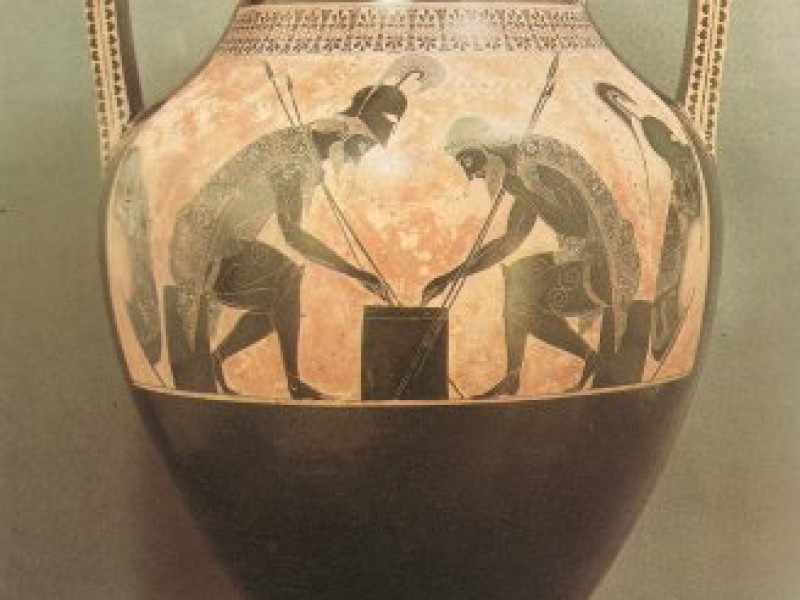Aeneas
A Dardanian hero. He was the son of Anchises and the goddess Aphrodite. Hesiod says that Aphrodite gave birth to Aeneas (Αἰνείας) at the peaks of Ida. Aeneas was of the Trojan royal line of Dardania. Aeneas was brought up on Mount Ida by nymphs who lived there. He married Creüsa (Creusa), daughter of Priam and Hecuba, and became father of Ascanius (Iülus). Since Anchises was crippled by a thunderbolt, Aeneas ruled in his father's place in Dardania.
Aeneas may have been a companion of Paris when Paris went to Sparta. At first, Aeneas did not join the war until Achilles drove him out of Mount Ida.
When Aeneas joined the war, he was second only to Hector as the best Trojan warrior. Aeneas was also second-in-command of the Trojan forces.
Diomedes seriously wounded Aeneas, before stealing Aeneas' immortal horses, which originally belonged to Tros. Aphrodite failed to rescue her son because Diomedes wounded her and drove her off of the battlefield. Apollo, however, spirited Aeneas away before Diomedes could kill him.
Although, Poseidon favoured the Greek forces throughout the war, nevertheless the sea god rescued Aeneas from Achilles, for it was foretold that he would rule the Trojan lines.
Aeneas was the only one of two Trojan leaders to escape the fall of Troy; the other being Antenor (who was also a Dardanian). Aeneas tried to escape with his family. Aeneas had to carry his crippled father on his back while holding his son's hand. Creüsa got separated from Aeneas and was killed, but according to Pausanias, she was rescued by Aphrodite and Kybele to prevent the Greeks from taking her as a concubine.
There are several tales of his adventures after Troy. One told of him being captured by Neoptolemus and becoming his slave (Little Iliad).
When Aeneas witnessed a serpent killing a Trojan seer named Laocoon and his sons, Aeneas knew Troy would soon fall, so Aeneas deserted Troy. Taking his family and his followers, Aeneas returned home to Mount Ida (Sack of Ilium).
And another tale says that Aeneas ruled Troy after the Greeks left, as Poseidon had foretold in the Iliad.
Apollodorus' Epitome says that Aeneas escaped from the city, carrying his father. The Greeks allowed him to escape because of his piety.
However, the most famous account about Aeneas after the fall of Troy can be found in the Roman epic poem known as the Aeneïd (Aeneid), told by Virgil (Vergil), in which he settled near present day Rome. Go to the Tales of Rome for details about the Aeneid.
The Aeneïd was sort of the combination of epics in Greek mythology. His journey to Italy was told like the Argonautica and the Odyssey in the first half. The setting in the second half of the Aeneid had a plot more like the Iliad, during the Trojan War.
Aeneas and his followers tried to find a new home. After a long and perilous sea voyage, they arrived in Italy. Aeneas decided to settle in Latium where Latinus, king of Latium, welcomed him. Latinus was in favour of Aeneas marrying his daughter Lavinia.
Due to hatred of Juno (Hera), who had hated all Trojans since the Judgment of Paris, the goddess stirred up trouble among the Italians. Juno caused Amata, wife of Latinus, to hate Aeneas, refusing to allow the hero to marry her daughter.
Juno also stirred up other Latin tribes including Turnus, leader of the Rutulians, who was a suitor of Lavinia. Most of the Latin tribes declared war on the Trojans and rallied under the leadership of Turnus. The Greek hero Diomedes, who settled in southern Italy, refused to take part in another war against the Trojans. He urged the warring Latins to make peace with Aeneas.
As the Trojans tried to hold back their enemies, Aeneas sought allies around central Italy. The Etruscans sided with the Trojans. An aged king of Pallanteum (within present-day Rome) named Evander also offered aid to Aeneas. Evander sent some men under the leadership of his son Pallas.
Many leaders on both sides fell in the war. Among the dead was Pallas, killed by Turnus. Aeneas avenged Pallas, killing Turnus in single combat. The war ended with Turnus' death.
See the Aeneïd for more about Aeneas' adventures.
After the war in Italy, Aeneas married Lavinia. They probably had a son named Silvius. Some said that Aeneas founded the city of Alba Longa; others said that it was his son Ascanius who founded this city. His descendant Romulus was to become the founder of the city of Rome and also became its first king.
According to Dionysius of Halicarnassus, Aeneas fell in battle against the Rutulians, and his body was never recovered in battle. But according to the poet Ovid, Venus (Aphrodite) persuaded Jupiter (Zeus) to make her son immortal. Juno had finally given up her enmity towards the Trojans and come to terms with Aeneas; Zeus' consort did not object to her step-daughter's request. At the end of his life, Venus took her son to live with her in Olympus.
Related Information
Name
Aineias, Αἰνείας (Greek).
Aeneas – "Terrible" (Latin).
Sources
The Iliad was written by Homer.
The Cypria, the Little Iliad and the Sack of Ilium were part of the Epic Cycle.
Homeric Hymn to Aphrodite.
Library and Epitome were written by Apollodorus.
The Aeneid was written by Virgil.
Metamorphoses was written by Ovid.
Related Articles
Aphrodite, Anchises, Hector, Paris, Diomedes, Achilles.
Trojan War, the Aeneïd.
Genealogy: House of Troy.
By Jimmy Joe



